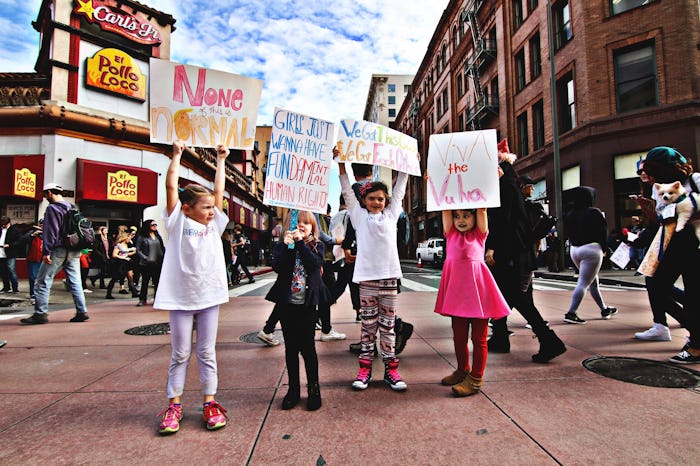The issue of "white feminism" has been gaining a lot of media attention. You may not be aware that it's a pejorative term that describes the kind of feminism that blatantly excludes the oppression of women who are not white, cisgender, able-bodied, or straight. Many women, myself included, learned about feminism through the eyes of white suffragettes and upper-class feminist leaders. But, today, almost 40 percent of America's female population are women of color, and there are women of all races who identify as LGBTQ+. If there was ever a question as to why you should talk to your daughter about white feminism ASAP, the wonderful diversity within this country is only one of the many reasons.
My daughter is culturally Hispanic, but often passes as Caucasian. She is a second-generation American, with parents both born and educated in the U.S. Her skin is fair, and her last name doesn't give away any ethnicity. She lives in a middle-class suburb, attends a good school, and is free of physical or mental disability. Because she has the privilege of not being personally affected by many of the issues other women of color face, she can easily fall into the trap of white feminism. It's my job as a parent not to let that happen.
Here are some reasons all women should talk to their daughters about white feminism.
1Different Women Face Different Injustices
Able-bodied white woman are not excluded from injustice. However, it's important for girls today to know that the the kinds of injustices white women face can vary greatly to those of black women, trans women, and women with a disabilities. Even an issue that affects all women, such as the wage gap, varies according to a woman's race.
Teach them that white women make 78 cents for every dollar paid to their male counterparts, but African American women are paid only 64 cents and Latinas only 56 cents, according to the National Women's Law Center. Closing the gap for white women is not closing the gap for all women. It's not only about fighting for equality among the sexes, but also to fight for equality for all races.
2Their Privilege Can Change At Any Time
Young girls must understand that although their race may not change, their socio-economic and ability status can change after job loss, divorce, or an accident. Women who come out as LGBTQ+ can also find themselves facing new issues of oppression and discrimination. Just because an issue doesn't affect you today, doesn't mean it won't affect you in the future and isn't affecting other women around you.
3They Must Listen And Learn From Other Girls
White feminism prevents a person from truly listening to the plight of others. Your daughter may hear stories about racial profiling or police brutality, but unless it directly affects her or a loved one, she may not be truly listening. Teach her to pay attention to the struggles of her friends, classmates, and the other women she meets, even if she doesn't yet understand them.
Culture writer Zeba Blay and senior women's editor Emma Gray of The Huffington Post note that "the most important thing any white feminist can do is educate herself, and listen and engage with the experiences of women of color without silencing them."
4Colorblindness Can Be Dangerous
Many parents claim that they've taught their children to be "colorblind." Although you should love and respect everyone equally regardless of race and ethnicity, the reality is that a person's identity and experiences are inherently related to the color of their skin. Everyday Feminism noted that "viewing someone completely devoid of racial context actually ignores the very real lived experience of the person standing in front of you."
5Intersectionality Is The Key
One goal all mothers should have for their daughters is to raise them with intersectionality. Also known as intersectional feminism, intersectionality, is the understanding that a person's identity and experiences are defined by much more than gender. In addition to gender, a person's race, class, sexual orientation, and ability status are interconnected. According to USA Today, these factors impact the way people experience oppression and discrimination. Moms can teach their children from a young age to stand up for those around them by actively caring about issues of injustice that don’t necessarily apply to them.
